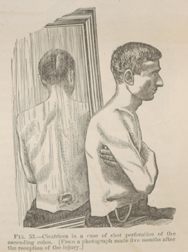Title: Deichler, G. P.
Source text: The Medical and Surgical History of the War of the Rebellion. (1861-65.), Part 2, Volume 2 (Washington, DC: Government Printing Office, 1876), 77.
Civil War Washington ID: med.d2e31584
TEI/XML: med.d2e31584.xml
FIG. 236.—Lieutenant G. P. Deichler, Co. I, 69th Pennsylvania, aged 22 years, was wounded by a conoidal musket ball, at Hatcher's Run, Virginia, March 25, 1865. The ball entered the right iliac region, and, passing through the ascending colon, made its exit a little to the left of the last dorsal vertebra. The patient was taken to the field hospital of the 2d division, Second Corps, in charge of Acting Staff Surgeon John Aiken, and from thence to Armory Square Hospital, at Washington, where he was admitted on April 1st, in an exhausted condition, with grave symptoms of peritonitis. There was a copious fæcal discharge from both wounds. Appropriate dressings were applied; a fourth of a grain of sulphate of morphia was ordered to be given every second hour, and stimulants were directed. On April 7th, sloughs separated from both wounds, and left a clean granulating surface. A large piece of sphacelated omentum was removed from the anterior wound. The opiate treatment was continued till April 27th, when there was a fæcal evacuation by the anus, for the first time since the injury. On June 12th, the discharge from the wounds was very slight. Acting Assistant Surgeon C. A. Leale, who reported the foregoing facts, states further, that the edges of the wounds were now refreshed and approximated by adhesive strips. On August 10th, the anterior wound was firmly healed. There was a small fistulous sinus at the posterior wound, discharging pus scantily. On this day, a photograph, from which the cut adjacent (FIG. 53) is copied, was taken at the Army Medical Museum, and the patient left the hospital for his home, at Lancaster, Pennsylvania, in excellent general health. The fistula soon healed. This officer was pensioned, and, in April, 1867, Pension Examiner J. Severgood was able to make a satisfactory report of his condition. Again in December, 1872, the Pension Office received information of the continued good health of this officer, though the effects of his terrible wound, as well as his antecedents, naturally "disqualified him from manual labor."
